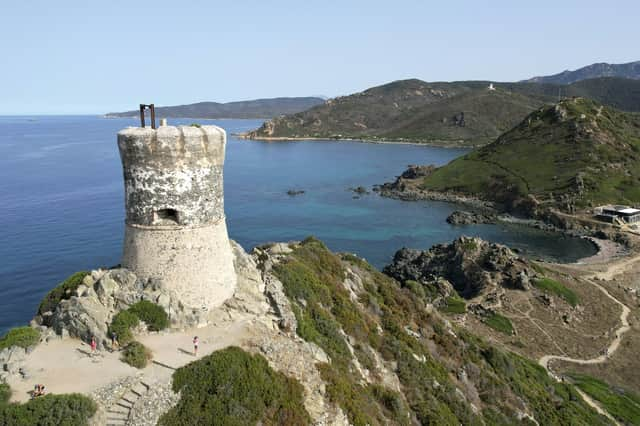Calls from Commonwealth leaders for the UK to pay reparations for slavery should be rejected
On the Costa Blanca in Spain last week, we visited one of the well-preserved lookout towers and castles dating back to the 16th century. These were established in the reign of King Philip II as protection against Barbary pirates, from the coast of North Africa, raiding Spanish communities. What these corsairs were after, primarily, were men, women and children who could be taken as slaves to be sold in the markets in Algiers, Tunis and Tripoli.
The legacy of the same period can still be seen today on the island of Majorca, where towns like Pollensa and Sóller were constructed miles from the coast, to protect the inhabitants from these piratical raids. These threats were not restricted to the Mediterranean. We have reports from the 1600s of villages in Ireland and south-west England being raided for slaves by North African pirates.


Endemic in ancient world
It has been estimated that raiders from Tunis, Algiers and Tripoli alone enslaved between one million and 1.25 million Europeans from the beginning of the 16th century to the middle of the 18th. It is a far cry from the popular perception of the slave trade being focussed on the transmission of Africans across the Atlantic by white Europeans.
Slavery was endemic in the ancient world; the Greek and Roman empires could not have existed without it. In the 8th and 9th centuries, Viking raiders provided markets in Spain and Egypt with slaves captured in large numbers from Eastern Europe – the very word “slave” derives from the term “Slav”.
Christianity, in the form of the letters of St Paul, brought to the world for the first time the radical notion that all human beings were equal under God, but Christian nations were as prone to practising slavery as Islamic ones. In Britain, it would take the energetic campaigning of the Clapham Sect, led most notably by William Wilberforce, to see the eventual abolition of the slave trade in 1807, although it would be another 26 years before the institution of slavery itself would be wiped out across the Empire.
That British traders were actively involved in the slave trade for a century and a half before this must always be to our national shame, and Scottish merchants were amongst those who enriched themselves on the back of this trade in human misery.
Royal Navy anti-slavery force
But from the early 19th century onwards, substantial steps were taken as a country to disrupt the transatlantic slave trade, with the Royal Navy being deployed, at considerable expense, to prevent the export of slaves. Squadrons of our ships were stationed off the cost of West Africa with the specific purpose of accosting slave vessels. Estimates put the overall sums spent by the United Kingdom in suppressing the slave trade at around 1.8 per cent of national income over a 60-year period to 1867, a sum equivalent to, or perhaps larger than, the benefits derived from the trade in the previous century.
The suppression of the Atlantic slave trade did not mean that slavery in Africa, or indeed elsewhere, ceased. Even after the cross-Atlantic trade in human misery was ended, East Africa in particular continued to be ravaged by the activities of Arab slave traders, from their base in Zanzibar. Much British Government action in Africa during of the 19th century was motivated by a desire to see an end to slavery.
‘Spirit of commerce and Christianity’
This was matched by individual and missionary endeavour. The great Scottish missionary and explorer, David Livingstone, was driven as much by a burning desire to see an end to the slave trade as by his wish to take the gospel to the people of Central and Southern Africa. His journals report the horror with which he viewed the large groups of men, women and children chained together and being forced to march to the coast for onward transmission to the Middle East.
It was Livingstone’s firm conviction that opening up Africa to legitimate trade, and thus providing alternative sources of income, was the best way to see an end to the buying and selling of human beings. He wrote to a colleague in November 1853 with the hope that he would live “to see the double influence of the spirit of commerce and Christianity employed to stay the bitter fountain of African misery”.
In later life, Livingstone’s motivations became more explicitly focussed on seeking the abolition of the slave trade, and his journeys of exploration had the purpose of seeking to identify trade routes to allow lawful commerce to thrive.
Livingstone died in 1873 without seeing an end to the African slave trade which he so hated. Yet his fame drove public opinion both in Europe and in America to encourage governments to take ever-stronger stances against the dreadful business. Slavery finally ended in Zanzibar when it became a British Protectorate in 1890, although it would be decades after until the Arab slave trade as a whole came to an end.
Slavery still blights modern world
All this puts into perspective the calls from Commonwealth leaders for a conversation about reparations for the slave trade, something which UK Prime Minister Sir Keir Starmer signed up to at last week’s Heads of Government Summit. Although Starmer said he was very clear that the UK would not be paying reparations, there have been growing calls from Commonwealth leaders for us to apologise and make payments.
The demands from African and Caribbean countries are understandable given the economic pressures they face, but in reality there is no case for us paying reparations given our history in the suppression of the slave trade, and the economic cost which this country has already borne.
A more fitting tribute to those who suffered as slaves would be to recommit ourselves to ensuring that slavery – which still exists in many forms throughout the world – must be brought to an end for good. That would be a more useful focus for government action than discussing reparations which will never be paid.


